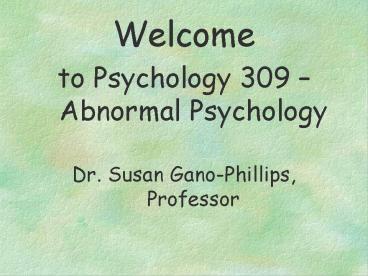to Psychology 309 Abnormal Psychology - PowerPoint PPT Presentation
1 / 19
Title:
to Psychology 309 Abnormal Psychology
Description:
... psychological assessment, therapy, research, teaching ... social norms change over ... Based on physical observation, psychological testing, and ... – PowerPoint PPT presentation
Number of Views:77
Avg rating:3.0/5.0
Title: to Psychology 309 Abnormal Psychology
1
- Welcome
- to Psychology 309 Abnormal Psychology
- Dr. Susan Gano-Phillips, Professor
2
- Prerequisites/Introductions
- Expectations
- Student expectations of me
- Professor expectations of students
- Syllabus Review
- Classroom Etiquette
3
- Student Expectations of Me
- I will come to class prepared
- I have broad training and practical experience in
Abnormal Psychology - I will attempt to assist students with learning
both in the classroom and outside - I will work to continually improve upon my
teaching - My LOVE of teaching and learning may be
infectious!
4
- Professor Expectations of Students
- Every student can succeed in this class!
- You will need to work hard, be an efficient
learner, and gain insight into your own learning
processes in order to succeed in this class - Developing skills in analyzing, synthesizing, and
evaluating information about Abnormal Psychology
is as important as memorizing definitions and
details - Students can and should learn independently, from
one another, as well as from the professor
5
Whos Who in Mental Health
- Clinical Psychologist
- Doctor of Philosophy (PhD) or Doctor of
Psychology (PsyD) degree - trained for psychological assessment, therapy,
research, teaching - Psychiatrist
- Medical doctor (MD) with training emphasis on
mental disorders - can prescribe psychiatric medications and
hospitalize patients - Psychoanalyst
- trained in psychoanalysis, the school of
psychology developed by Sigmund Freud
6
Whos Who in Mental Health
- Social Worker
- Master of Social Work (MSW) degree with training
in social policy, sociology, counseling - Therapist
- Master of Arts (MA) or Master of Science (MS)
degree with training in counseling children,
adults, and families
7
Daily Outline
Defining Abnormality Diagnosis Definition and
Purposes DSM-IV classification
system Self-diagnosis tendencies in PSY 309
8
Definitions of Abnormal Behavior
- Deviating from statistical norms (unusual)
- Causing personal distress
- Exhibiting maladaptive qualities
- Violating social norms
9
Defining Abnormal Behavior-1
- Statistical deviance
- behavior differs from the norm by degree
- implies a continuum of human behavior from
normal to abnormal - abnormal behavior viewed as a measurable variable
10
Defining Abnormal Behavior-2
- Personal distress
- behavior causes personal anguish
- allows people to determine for themselves whether
or not their behavior is abnormal
11
Defining Abnormal Behavior-3
- Maladaptiveness
- behavior harms the individual or society or
prevents individuals from fulfilling their
potential - judges behavior by its function
12
Defining Abnormal Behavior-4
- Violation of social norms
- behavior goes against the expectations of
society, is socially disapproved of, is
unpredictable, and does not conform to the
majority - social norms change over time
13
Diagnosis
- Process of determining the nature of a persons
disorder and deciding that a person fits into a
particular category - Serves four main purposes
- provides an organized way to refer to a syndrome
(improves communication) - provides a focus for research
- suggests an appropriate treatment
- provides predictive information about a disorder
14
The Diathesis-Stress Model
- Diathesis a genetic predisposition to a specific
disorder - Stress a precipitating event or experience
- Diathesis-stress model explains the etiology of
mental disorder as the result of an interaction
between a predisposition and a precipitating event
15
Possible Physiological Factors in Mental Illness
- Genetics
- Brain chemistry
- Damaged anatomy
- Illness
- Brain atrophy
- Hormones
- Germs
- Injury to brain
- Tumors
The belief that physiological factors cause
disorders leads to a medical model for treatment
16
Possible Psychological Factors in Mental Illness
- Stress
- Early childhood problems
- Low-self esteem
- Loss
- Ineffective coping skills
- Loss of trust
- Poverty
- Lack of support systems
- Poor peer relationships
- Guilt
- Shame
The belief that psychological factors cause
disorders leads to a therapeutic approach to
treatment
17
Possible Social and Cultural Factors in Mental
Illness
- Economics
- Cultural expectations
- Social stereotypes
18
What Is the Biopsychosocial Perspective?
- Understanding everyday actions and human
behavior requires attention to various forces - biological
- psychological
- social
19
The Process of Psychological Assessment
- Gathering data and integrating and interpreting
information about a patient - Based on physical observation, psychological
testing, and family history - Used to diagnose and treat the individual































